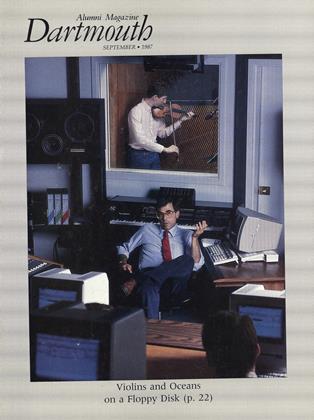Freedman listed what he believes to be the most important issues facing the College:
Rational Debate
"The great issues, educational and moral, that face Dartmouth—indeed, that face the nation and the world— must be debated and discussed fully. No one doubts that Dartmouth will thrive upon differences of opinion among those who love it."
"In the end, we will be judged not by the shrillness of our rhetoric or in the self-dramatization of our actions, but by the quiet, measured force of our reason."
Specialization
"Too often, the increasing tendency toward specialization has had fragmenting consequences for the life of the mind. It has sheltered men and women of broad-ranging imagination behind narrowly drawn disciplinary bounds, thereby discouraging them from becoming educated in the fullest sense of that worthy term."
"Dartmouth has been and must continue to be more than merely an association of fragmented academic specialties. It must be one commonwealth of liberal learning, and its task must be to preserve and convey the indivisibility of human experience and knowledge."
Liberal Education
"Society's need for liberally educated men and women has never been greater than it is today, as we ponder still the transforming horror of the Holocaust, as we live daily with the existential possibility of nuclear annihilation, as we experience the awful anguish of failing to meet the simple imperative of feeding all the people on our planet."
International Study
"We must continue to offer our students an opportunity to widen their angles of vision on the world by infusing our curriculum with an international perspective and by emphasizing the study of foreign languages."
"We must support teaching and research programs that hold special promise of enlarging the global dimension of the College. We must facilitate the enrollment of students from foreign countries in order to increase the cultural and ethnic diversity of the College. And we must encourage the appointment of visiting professors from foreign universities in order to expand the intellectual breadth of the College."
Welcoming the Loner
"We must strengthen our attraction for those singular students whose greatest pleasures may come not from the camaraderie of classmates but from the lonely acts of writing poetry, or mastering the cello, or solving mathematical riddles, or translating Catullus. We must make Dartmouth a hospitable environment for students who march to a different drummer, for those creative loners and daring dreamers whose commitment to the intellectual and artistic life is so compelling that they appreciate, as Prospero reminded Shakespeare's audiences, that for certain persons a library is dukedom large enough."
The president-to-be plants a kiss on thecheek of wife Sheba before rushing to robe.
The new man is helped with his inauguration robe amid a flurry of activity backstage atParkhurst Hall.
Dean of the College Edward Shanahan led the procession, including President DavidMcLaughlin, left, and New Hampshire Governor John Sununu, right.
Vartan Gregorian, president of the NewYork Public Library and a friend of Freed-man's since their days together on the faculty of the University of Pennsylvania,described the new president as a "scholar,teacher,meticulous organizer and administrator, great listener, curious, both educated and cultured . . . [an] honorableperson, quiet but forceful, believer in sharedgovernment and shared values . . . and agreat reader."
President McLaughlin received an honorary doctor of laws degree during the inaugurationceremony. Freedman praised McLaughlin for leaving the College "splendidly housed, se-curely endowed, and confidently poised for a wide range of significant new opportunities."Judy McLaughlin was awarded a doctorate of humane letters. At left is Professor MerelynReeve and at right is Professor William Slesnick.
 View Full Issue
View Full Issue
More From This Issue
-
 Feature
FeatureMystery on the Mountain
September 1987 By Daniel Q. Haney -
 Feature
FeatureDiary of a Long Distance Runner
September 1987 By Tim Hartigan '87 -
 Cover Story
Cover StoryThe Computerization of Music
September 1987 By Jon Appleton -
 Feature
FeatureHeeding the Beat of a Different Drummer
September 1987 By Teri Allbright -
 Class Notes
Class Notes1976
September 1987 By Martha Hennessey -
 Class Notes
Class Notes1983
September 1987 By Kenneth M. Johnson
Features
-
 Feature
FeatureDrug Buster
Nov/Dec 2007 By CHRISTOPHER S. WREN ’57 -
 Feature
FeatureTHE EXPERIMENTAL THEATRE
June 1954 By HENRY B. WILLIAMS -
 Feature
FeatureFox Trot
Sept/Oct 2000 By John Barton -
 Feature
FeatureA Man Ahead of His Time
JANUARY 1967 By Parker G. Marden -
 Feature
FeatureWomen at the Top (almost)
May 1977 By SHELBY GRANTHAM -
 Feature
FeatureThe Dinan Decade
OCTOBER, 1908 By Shelby Grantham



